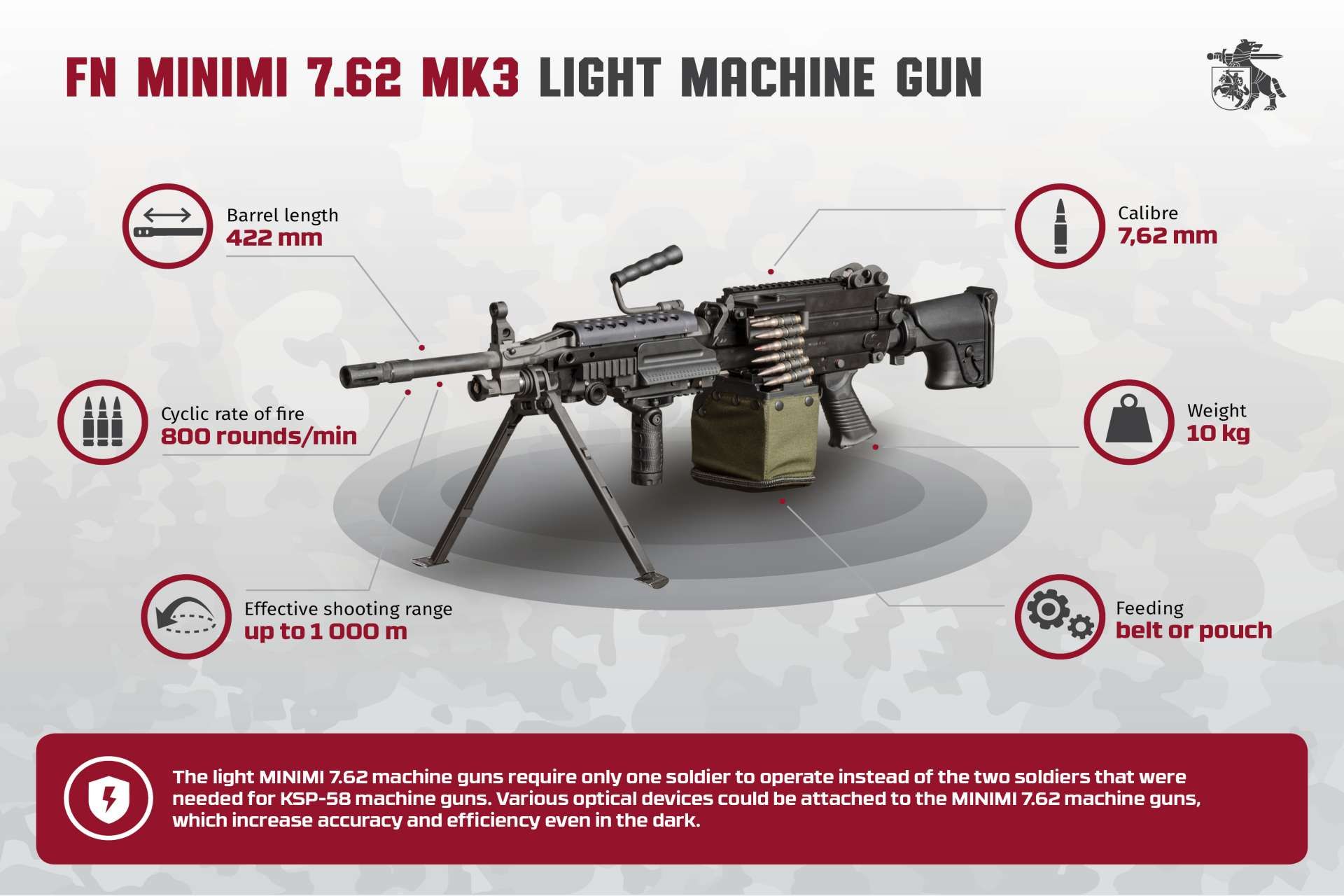Breaking News
Lithuania Speeds Up Deployment of Belgian FN MINIMI 7.62 MK3 Light Machine Guns to Face Russia.
On September 4, 2024, the Lithuanian Ministry of Defense announced an early acquisition of FN MINIMI machine guns, made possible by a recent increase in the defense budget. The purchase, involving a €5 million contract with FN Herstal S.A. of Belgium signed in February 2023, is part of a strategic initiative to enhance the capabilities of the National Defence Volunteer Forces and the State Border Guard Service of Lithuania.

FN Herstal MINIMI 7.62 MK3 Light Machine Guns (Picture source: Lithuania MoD)
This purchase was made possible thanks to a significant increase in the defense budget approved by the Lithuanian government, which allocated an additional €130 million to this sector in August. "This strategic decision not only accelerates our acquisitions but also strengthens inter-institutional cooperation," explained Defense Minister Laurynas Kasčiūnas. "The new machine guns will be distributed between the National Defence Volunteer Forces of the Lithuanian Army and the State Border Guard Service, thus enhancing our overall response to security."
The FN Minimi 7.62 Mk3, a third-generation light machine gun, combines power and lightness while offering significant improvements in ergonomics and mobility. This weapon is renowned for its proven reliability in numerous combat situations.
This machine gun features an adjustable stock offering five length adjustment positions and six cheek rest height adjustment positions, incorporating a hydraulic buffer to reduce recoil. The bipod integrated into the handguard remains usable even with an accessory mounted on the lower rail. The cocking handle allows for cocking with either the strong or weak hand, while the feed tray with belt retaining pawls makes one-handed loading easier.
The FN Minimi 7.62 Mk3 comes standard with a 422 mm barrel. It is available in several variants, including the tactical version with an adjustable stock, the para version with a telescopic stock, and the standard version with a fixed stock. A customized upgrade program is available for users with earlier models of the FN Minimi 7.62. Additionally, a conversion kit is available to fire 5.56x45mm NATO cartridges.
The weapon operates on a gas-operated, rotating bolt principle and measures 1,026 mm in length when extended and 950 mm when collapsed. It weighs approximately 8.8 kg and has a cyclic rate of fire of about 800 rounds per minute. The feeding system can use either a belt or a pouch. A full range of accessories, tested and certified by FN Herstal, as well as various cartridges, are available for this machine gun.
The FN MINIMI, known for their lightness and modernity, will replace older and heavier systems such as the KSP-58, FN MAG, and MG3. These new weapons will improve the mobility and efficiency of Lithuanian soldiers, allowing for simplified maintenance that can be performed by a single soldier—a significant advancement over previous models requiring two people.
Furthermore, these machine guns are equipped to support various optical devices, enhancing accuracy and nighttime efficiency. Although this is the first time Lithuania has equipped itself with this type of armament, the FN MINIMI are widely used by several NATO member countries, making them a strategic choice for integration into alliance standards.
According to Military Balance 2023 and the CIA Factbook, the increase in the defense budget, which will reach 3.2% of GDP this year, will also allow for the acquisition of new mobile air defense systems, unmanned aerial vehicles, and anti-drone systems, ensuring a significant update to the country's defensive arsenal.
This substantial investment in defense reflects Lithuania's political will to secure its borders and strengthen its position within Europe and NATO in the face of current and future security challenges.
Lithuania, located in a strategically sensitive region of Europe, continues to strengthen its armed forces in response to a deteriorating regional security environment. The recent invasion of Ukraine by Russia in 2022 has exacerbated Lithuania's security concerns, making Russia the primary perceived threat to its national security. In response, Lithuania not only reinstated conscription in 2015 but also increased its defense spending and modernized its army to better meet these challenges.
The Lithuanian armed forces, although relatively small with about 18,000 active-duty personnel, are well-equipped and supported by the NATO defense structure. Lithuania largely depends on NATO for its combat aircraft capability, benefiting from Alliance air policing deployments. Moreover, Lithuania actively participates in NATO and EU operations and seeks to strengthen its integration into European defense initiatives, such as the European Sky Shield initiative to improve its air defense capabilities.
The National Defence Volunteer Forces of Lithuania, also known by the acronym KASP (Krašto Apsaugos Savanorių Pajėgos), are an essential component of the Lithuanian armed forces. KASP is formed by civilian volunteers who commit to supporting and enhancing the country's defense capabilities. This unit was established to integrate civilian resources into national defense, allowing for rapid mobilization in times of crisis or conflict.
KASP members are trained in basic military tactics, including weapon handling, combat tactics, survival in hostile environments, and first aid. In addition to their military training, they participate in regular exercises to maintain their operational readiness. KASP plays a crucial role in territorial defense operations, working closely with the regular army to secure borders and strategic points in the country.
The State Border Guard Service of Lithuania, or VSAT (Valstybės Sienos Apsaugos Tarnyba), is responsible for monitoring and protecting Lithuania's borders. This service plays a vital role in managing immigration, preventing illegal cross-border trafficking, and securing borders against potential threats.
Border guards are equipped to conduct land and maritime patrols and have access to advanced technologies for border surveillance and control. They are also trained to respond to emergencies, including search and rescue operations. VSAT cooperates closely with other national and international security agencies to exchange information and coordinate border security efforts.
























